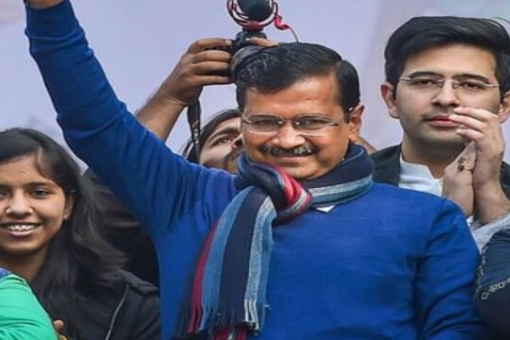
 Source :
Source : There is a Whatsapp forward that has been going viral after the Aam Aadmi Party (AAP) won the Delhi Assembly election:
“Amit Shah asked the people of Delhi: Vote kisko diya?
Pat came the reply: Aap ko diya.”
That’s the thing. The answer’s clear and unclear at the same time.
What does the BJP’s loss in Delhi mean? Is it that the Hindutva platform of hate has no takers? Is it that Hindutva pales before ‘real’ vikas? Is it that a majority of the voters of Delhi are not communal? How should one assess Kejriwal’s thumping victory in broader political terms? There are no clear answers.
The AAP supremo on Tuesday chanted ‘Bharat Mata ki jai’ at the end of his victory speech. He followed it up with a salutation for Lord Hanuman. He said it in a matter-of-fact manner, as if it was a natural progression of his speech.
In the aftermath of the result, neither did the BJP call the AAP anti-Hindu, nor did the Congress term it secular.
Many analysts called Kejriwal a shrewd politician for having kept Hindutva forces at bay by simply ignoring them, and not acknowledging the communal agenda. One analyst, during a television debate, termed the battle as one between vikas (development) and vinash (destruction). Kejriwal seemed to have distanced himself from Shaheen Bagh as part of the same strategy.
There seem to have been two strands to the AAP's strategy. The first is that of projecting the positive governance model of the AAP. The party sought to portray that people in Delhi saved money due to reduced utility bills, children received better education, and people in general received better health facilities in their own neighbourhoods. Both Hindus and Muslims benefited from these aspects of governance. It would stand to reason that people attach greater importance to basic necessities like travel and electricity than ideological issues.
The second strand seemed to be to avoid engaging in communal talk, steering largely clear of the Shaheen Bagh protests, and not making any specific references to the Muslim community. Ahead of the elections, Kejriwal visited several temples. In fact, when BJP leader Manoj Tiwari said that the AAP leader made the temple "impure," he only helped people recall the visit to the holy site by the chief minister.
In short, Kejriwal has tried to portray himself as a good Hindu, complete with a teeka on his forehead. He steered clear of the concerns of minorities and their protests. In fact, he spoke about removing protesters from Shaheen Bagh so that traffic on the highway can be restarted.
As soon as the results of the Delhi elections became apparent, sections of the media have begun wondering if Kejriwal has national ambitions. Curiously, this speculation usually does not arise when other regional leaders establish their electoral popularity — in states bigger than Delhi.
While the BJP has not got many seats in Delhi, its communal ideology continues to be pervasive. The party has been defeated, but not its ideology. The saffron party's campaign revolved around the Citizenship Amendment Act, Pakistan, Shaheen Bagh, etc. There were also some highly divisive comments made by the likes of Anurag Thakur and Yogi Adityanath.
However, the AAP chose to counter emotive Hindutva issues by simply sidestepping them and focussing on development issues instead. The party did not counter communalism with secularism, and the BJP's communal campaign went unchallenged till the end.
Many of those who voted for the AAP in the recently-concluded election were those who were at the forefront of the fight against communalism. However, the party has not publicly acknowledged this fact.
In a sense, the Delhi elections have reshaped the way in which one can view the concepts of communalism and secularism.